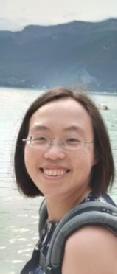Wing Ying Chow
How did your journey into science begin?
I always enjoyed finding self-consistent explanations for why things are the way they are, although I am not sure when I decided I would like to be a scientist. Growing up as a girl in Hong Kong in the 80-90s meant that everyone around me had few expectations that I would have any interest or aptitude in science. As a child, I don't know anyone who is a scientist in real life, but I always had an inkling that science is something that I want to do. In primary school, I have a distinct memory where I wrote in an exercise book that "when I grow up, I want to be a lawyer, but I also want to be a part-time scientist" -- I knew that being a lawyer is a real job, but I was convinced that no one actually does science as a real job full-time. I remember the little thrill of writing out the second half of that sentence as if I were stating something that is forbidden, or simply impossible.
The first time that I seriously considered doing a degree in science was when I came to the UK to do my A-levels. I realized how much I wasn't interested in law when I was trying to put together an application to study law in Hong Kong at my parents' request. With my teachers' encouragement, I decided to apply to read Natural Sciences at Cambridge. My parents, like me, weren't convinced that studying science is much good for a "real job", but I convinced them by pointing out that I probably won't get into Cambridge if I applied to do law. Everyone in my family was surprised (including me) that I did get in.
When I first started my degree, I knew that I enjoyed chemistry and marine ecology. I thought that maybe these would meet in the middle as biochemistry. It is really a stroke of luck that I ended up in the Natural Sciences course where I can study different disciplines in depth --- I discovered that I enjoy chemistry far more at the level of challenge and breadth covered at university level, especially the quantum mechanics and physical chemistry courses. In the first summer of my degree, I was asked to work as an unpaid accounting assistant in my dad's law firm to get more exposure to what a real job is actually like. To avoid a repeat of that experience, I found summer research internships at university for all subsequent years of my degree. The exposure to a range of scientists at different career stages, working in industry as well as academia, further confirmed that it is possible to get paid doing science in many different ways. It really sounds too good to be true! One of my summer research internships also led directly to my PhD studentship in solid-state nuclear magnetic resonance spectroscopy, which is what I am doing now.
What is your favourite thing about your research?
I love piecing ideas together from different disciplines. My work uses the physics of nuclear magnetic resonance to learn about the chemical and biological processes that go on in our bodies. It is a never-ending journey of learning and discovering, and I am often intrigued by the gaps in the things that we thought we already know. I especially enjoy seeing magnetic resonance (not only nuclear) applied in creative new ways.
Why do you think it is important to highlight women and gender minorities in science? What does it mean to you?
More women are doing science than ever before, so there are many excellent women scientists that deserve recognition for what they are doing. However, what I have noticed is that it is easy to think that all the problems have been solved just because there are now more women in science. They are not! Unfortunately, there is still plenty of entrenched social norms of what a person can do and want to do based purely on their gender. This is not okay because it creates a constant headwind that women scientists have to work extra to counteract. It is unfair and it means that the talents of everyone in society cannot be used most efficiently.
Highlighting women in science is part of the broader work of reimagining classic gender roles. Whether someone is called Jane or John shouldn't affect whether and how we think of them as a mechanical engineer or a stay-at-home parent. We shouldn't put people of any gender into predefined boxes of aptitude and interest.
Finally, when I look back at my journey into science, I wish I could go back and tell my younger self that someone like me is allowed to do science and can be good enough at it to do it as a job. Even after finishing my PhD, there are people who questioned why I chose this career path and wondered aloud whether I am disadvantaged because clearly, all the males would be better at it than me. If I was a less headstrong person and if I cared more about the opinions of the people around me at that time, I may well have ended up doing something else. It has been a journey of many years with the constant voice in my head (and sometimes unfortunately external) that told me I can't possibly be good enough just because of who I am. The fact that I made it this far is a credit to the support and encouragement of some truly outstanding mentors who believed in me, long before I learnt to believe in myself. I hope that I can pay it forward for the next generation of scientists.

